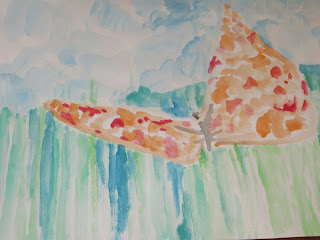The Lyf so short, the craft so long to Lerne
Weekends are terribly long and lonely for James since there is no therapy scheduled and he loses the sense of time passing while alone in his room. He waits. I am at home knowing he is waiting and I inevitably become frustrated with Imogen's lack of urgency to leave the house. At some point, I will shout at her to hurry which I know makes her feel sad and guilty. I am torn between the two of them.
I try to make it up to her with a stop at Gourmet Garage which is right by the hospital and allowing her to choose whatever treat she wants to bring with her. She smiles at me on the corner waiting for the light to change and takes a big swig of her hot pink vitamin water. Upper Manhattan was foggy and drizzly.
Kristi Goslar, the chorus master at Imogen's school, is preparing for the end of the year recital. James assisted Kristi last year in creating with the children a backdrop for the performance. Kristi thought it might inspire James to be included in this year's effort by painting a small watercolor to include in the larger piece. I suggested this to James today and I set him up with his paints. He remembered that Kristi chose a theme last year and asked for this year's concept. I said, "Dreams." He finished rather quickly. I think he misunderstood my explanation, slightly, believing he was making a mock-up to base the larger piece on. I probably did not explain it well enough but he was happy once I clarified that his rectangle would be attached to the children's work.
James's painting made me think of Walter Benjamin's Paul Klee painting, Angelus Novus. Benjamin explained it thus:
"A Klee painting named 'Angelus Novus' shows an angel looking as though he is about to move away from something he is fixedly contemplating. His eyes are staring, his mouth is open, his wings are spread. This is how one pictures the angel of history. His face is turned toward the past. Where we perceive a chain of events, he sees one single catastrophe which keeps piling wreckage upon wreckage and hurls it in front of his feet. The angel would like to stay, awaken the dead, and make whole what has been smashed. But a storm is blowing from Paradise; it has got caught in his wings with such violence that the angel can no longer close them. This storm irresistibly propels him into the future to which his back is turned, while the pile of debris before him grows skyward. This storm is what we call progress."
James's bandage on his trach gap was removed and his neck belongs to him again. He appears thin.
I asked him if he wanted to paint a bit more since the first watercolor was quick to finish. He painted a portrait of me. As he painted, we talked about the transition to come and his feelings about it. He told me that his psychologist asked him if he would like to return to Mt. Sinai, after his recovery, to give a talk to patients, similar to the one we attended yesterday. James told me he had nothing to offer regarding his experience of rehabilitation.
I took a breath and thought about that statement.
I told him it was early to know how to feel about his time at Mt. Sinai and it was true, that he has yet to be defined or shaped by his brain injury. I shared my thoughts with him by saying that if he were a professional in a specific capacity--such as journalist, attorney, or surgeon--it would be difficult to face the realization that a return to one's work may not be possible, especially in the short-term. The rehabilitation process would include a reckoning of sorts for a person that was specifically defined by their career--an identity forged by one's occupation would dictate how one would face the challenges of finding meaning in being that was not generated by the capacity to work.
I believe that James has a different approach to being because he is an artist. Making can take the form of many things. Duchamp played chess. It seems a romantic notion but it is actually quite grounded and practical. James was constantly making in everything he did--his being is making. The brain injury does not effect him in the same way as a journalist that is unable to write, make deadlines, travel to war torn regions or a surgeon that has to pick up a scalpel and cut into a person's flesh with precision.
James's future is wide open. I am excited to see what he will do in the studio or with his music. Whatever the outlet ends up being for his art practice, he will return to work immediately as part of his rehabilitation. He does not have to lament over what has been lost because his life is ripe for opportunity, in the same manner as before his brain infection. As he recovers, he will be able to play with it--the injury will become part of his work--not in a literal sense, but an organic, cosmic one. He does not have to limit himself as an "artist that has recovered from a brain injury." That's absurd. Would he require that definition if he overcame a horrible case of poison oak? The artist that survived a rash, a presentation in ten slides.
I think this returns to the concept of his brain injury being a "big deal." Life is a big deal. Let's live it.

Jennie, thank you so much. Please tell James it is absolutely beautiful and it will inspire the children. Xo
ReplyDelete